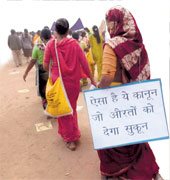 |
| MILES TO GO: Getting relief under the Domestic Violence Act may not be as easy as it is being made out to be |
That a silver lining can have a black cloud to it was never more evident than in the recent passage of the Domestic Violence Act. Less than a month after the Act became law — cheered by women’s and legal rights groups which had lobbied hard for it — there is concern that the law might just turn out to be another ineffective piece of legislation, all the hype surrounding its enactment notwithstanding.
The law, many believe, is ambiguous in its terms and there are various hurdles in the way of its implementation. The most troublesome issues revolve around the rights and privileges of protection officers (PO) and the provision for the shelter of abused women.
Even while the Act was being formulated, many women lawyers and activists had pointed out that the law may lose teeth unless the rights of the PO, as envisaged in the Act, are adequately defined and strengthened.
Chapter III, Clause 5 of the Act says: “A police officer, Protection Officer, service provider or Magistrate, who has received a complaint of domestic violence or is otherwise present at the place of an incident of domestic violence,…shall inform the aggrieved person of her right to make an application for obtaining relief by way of a protection order, of the availability of the services of service providers, of the availability of the services of the protection officers, of her right to free legal services and of her right to file a complaint under Section 498A of the Indian Penal Code.”
But, as Radha Rangaswamy, senior Supreme Court advocate, points out, the Act does not empower the protection officer to ensure that the complainant has a right to dignified residence.
What is also missing in the Act is a specific role for the PO. Some believe that the Act should give POs the power to approach the police if they receive a complaint from a victim of domestic violence. The police should then be obliged to come to the aid of the complainant.
A senior lawyer at the Lawyers’ Collective, which was among the groups that helped the law take shape, says the PO is supposed to work as an outreach officer of the court for aggrieved woman. The Act lays down that the protection officer will make available support systems to the victim. But, says the lawyer, the problem lies in the absence of adequate machinery and support systems.
“There are not adequate shelter homes that can be approached for putting up a victim of domestic violence,” says the lawyer, speaking on condition of anonymity.
Of course, the law does have provisions for a shelter home for anybody who complains of being a victim of domestic violence. But it does not make it mandatory for shelter homes to provide assistance to the aggrieved and leaves it to their discretion and also on the availability of facilities with them. Activists stress that there are not enough shelter homes in the country anyway. The few existing ones are already bursting at the seams and are ill-maintained. Hence, not giving the PO the right to protect the woman in her own home weakens the law.
Sayeeda Hamid, member (social sector), Planning Commission, believes that most of the legislation that has been made for women in India is as good as the paper it is written on. The Domestic Violence Act does not speak of any funding and has not set any mechanism in place to ensure the safety of women facing threats of violence, she points out. However, Hamid says that the Eleventh Plan will look at how the government can provide relief to aggrieved women by setting up more shelter homes and appointing “Special Marriage Officers” to resolve disputes.
There is an urgent need for more specific provisions, backed by adequate funding. Laws such as the Domestic Violence Act will be effective only if there is a real push and will behind them,” she says.
Hamid cites the example of an educated and accomplished woman, a victim of domestic violence, who has lately been running from pillar to post to get justice. The law does not even help women from privileged sections of society, so it is likely to be completely ineffective when it comes to women from the weaker sections, she argues.
Curiously, the ministry of law and justice seems unperturbed by the loopholes in the Domestic Violence Act. Sources in the ministry assert that there is no proposal to amend any of the clauses regarding protection officers or the service providers. They hold that the ministry has not received any feedback from any women’s group or any NGO working in this field suggesting a revision or amendment. In any case, an official points out, now that the Act has come into effect, it is up to the states to appoint special protection officers.
Clearly, the Act — however good the intentions behind it — is still a long way from providing help to those affected by domestic violence. Activists fear that till the loopholes are plugged, it will be a while before women — mothers, daughters, wives or domestic workers — can be safe even within the four walls of their own homes.










